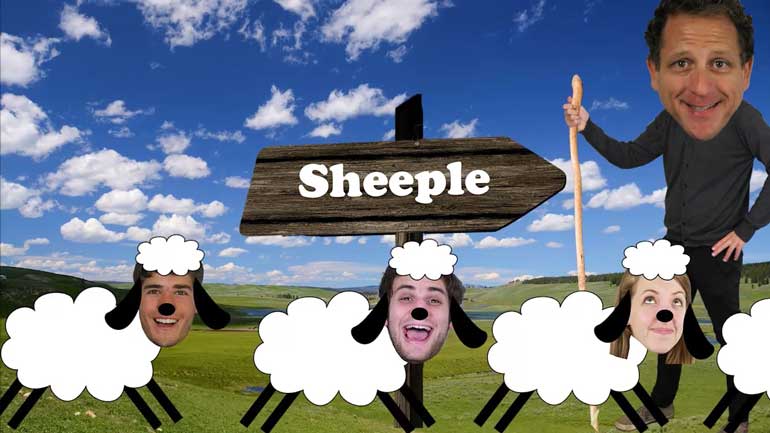ShmoopTube
Where Monty Python meets your 10th grade teacher.
Search Thousands of Shmoop Videos
AP Psychology 2.5 Testing and Individual Differences 7 Views
Share It!
Description:
AP Psychology 2.5 Testing and Individual Differences. Which of the following statements represents the work of L.L. Thurstone?
Transcript
- 00:04
And here's your shmoop du jour brought to you by LL
- 00:07
Thurstone who conceived of the law of comparative judgment which has an [Thurstone stood looking at a chalkboard]
- 00:11
equation that looks like this.. Now just because we may not understand it doesn't
- 00:15
mean we should judge it alright which of the following statements represents the
- 00:20
work of LL Thurstone and here are the potential answers... [mumbling]
Full Transcript
- 00:30
...All right since you're so
- 00:31
intelligent perhaps you initially suspected B of sounding oddly familiar
- 00:35
and you'd be right however that answer is actually describing Robert Sternberg [Pair of eyes thinking of Triarchic theory]
- 00:39
Triarchic theory of intelligence which separates intelligence into practical
- 00:44
creative and analytic abilities creative guess and you were practically right but
- 00:49
upon further analysis well it's not quite there so cross out B... D
- 00:53
sounds a lot like something Thurstone would have said as well but this answer
- 00:57
speaks specifically to Gardner who outlined eight types of intelligence [A list of Howards multiple intelligences]
- 01:00
specifically emphasizing the fact that one does not need to be academically
- 01:04
successful to possess intelligence and just like that kids across America were
- 01:08
quoting Gardner to their parents but just because he said intelligence [Young boy quoting Gardner to his Mom]
- 01:13
doesn't solely encapsulate achievements in academia doesn't mean you shouldn't
- 01:17
try..Yeah not the answer we're looking for so cross that out...And E certainly
- 01:22
isn't it either that outdated conceptualization of intelligence
- 01:25
belongs to Charles Spearman and his g-factor thing. Spearman believed various [A living room and Charles Spearman appears]
- 01:30
cognitive tests could all be used in conjunction with one another to produce
- 01:33
a G factor that could indicate one's intelligence with such a simplistic [A digram of Spearman's G-Factor theory]
- 01:37
understanding of intelligence we're attempting to give spearmen a low G
- 01:41
factor rating but well then we'd be stooping to his level so cross out E..
- 01:44
Meanwhile C sounds a lot more like something Thurstone would have said if
- 01:48
only it didn't equally apply to our aforementioned Gardner and Sturnberg [Thurstone and Gardner shrugging his shoulders]
- 01:52
cross out C.. Well, we're left with A Thurstone was one of the first dudes
- 01:57
to study mental abilities and intelligence and he identified seven
- 02:01
specific mental abilities that he proposed to be more important than any [Thurstone's seven mental abilities in a list]
- 02:05
measure of quote general intelligence unquote...
- 02:09
And seeing as these did in fact include math and verbal abilities and also [Thurstone's equation on a chalkboard]
- 02:14
stated that people have varying strengths in each then A is definitely
- 02:18
our answer of the day, though we're not sure what G factor Spearman would have given
- 02:23
Thurstone after hearing his theories... [Spearman dressed in trendy clothing stares at Thurstone]
Up Next
AP Psychology 2.2 Social Psychology. Which of the following was an independent variable manipulated in Asch's research?
Related Videos
AP Psychology 1.1 Personality. According to Freud, these three parts of personality are constantly in conflict.
AP Psychology 1.1 Sensation and Perception. The process by which the brain can turn sensory stimuli from the outside world into electrical signals...
AP Psychology 1.1 Social Psychology. Which of the following best describes social psychology?
AP Psychology 1.1 States of Consciousness. Who conducted research on REM sleep deprivations?




